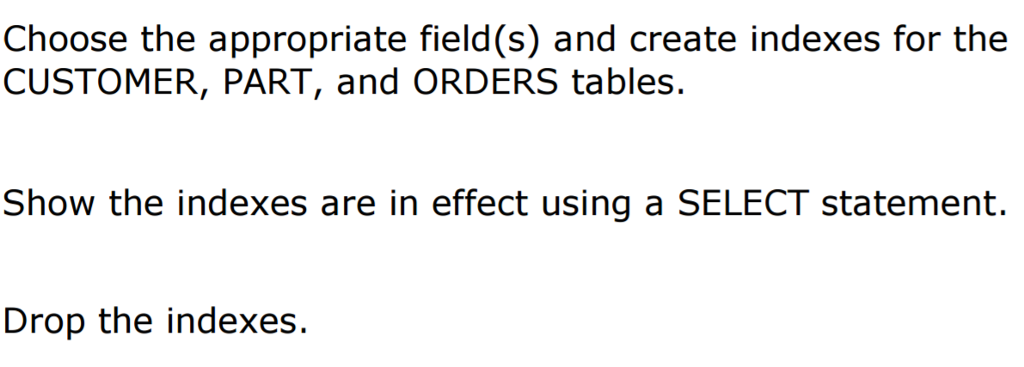Question
part table: create table part (partnum numeric(10) not null, description varchar(20) not null, price decimal(10,2) not null); insert into part values ('54', 'PEDALS', '54.25');
 \
\
part table:
create table part (partnum numeric(10) not null, description varchar(20) not null, price decimal(10,2) not null);
insert into part values ('54', 'PEDALS', '54.25');
insert into part values ('42', 'SEATS', '24.50');
insert into part values ('46', 'TIRES', '15.25');
insert into part values ('23', 'MOUNTAIN BIKE', '350.45');
insert into part values ('76', 'ROAD BIKE', '530.00');
insert into part values ('10', 'TANDEM', '1200.00');
customer table:
create table customer (name varchar(10) not null, address varchar(10) not null, state varchar(6) not null, zip varchar(10) not null, phone varchar(10) null, remarks varchar(30) not null);
insert into customer values ('TRUE WHEEL', '550 HUSKER', 'NE', '58702', '555-4545', 'NONE');
insert into customer values ('BIKE SPEC', 'CPT SHRIVE', 'LA', '45678', '555-1234', 'NONE');
insert into customer values ('LE SHOPPE', 'HOMETOWN', 'KS', '54678', '555-1278', 'NONE');
insert into customer values ('AAA BIKE', '10 OLDTOWN', 'NE', '56784', '555-3421', 'JOHN-MGR');
insert into customer values ('JACKS BIKE', '24 EGLIN', 'FL', '34567', '555-2314', 'NONE');
orders table:
create table orders (orderedon date, name varchar(10) not null, partnum numeric(10) not null, quantity numeric(10) not null, remarks varchar(30) not null);
insert into orders values ('1996-05-19', 'TRUE WHEEL', '76', '3', 'PAID');
insert into orders values ('1996-09-02', 'TRUE WHEEL', '10', '1', 'PAID');
insert into orders values ('1996-06-30', 'TRUE WHEEL', '42', '8', 'PAID');
insert into orders values ('1996-06-30', 'BIKE SPEC', '54', '10', 'PAID');
insert into orders values ('1996-05-30', 'BIKE SPEC', '23', '8', 'PAID');
insert into orders values ('1996-01-17', 'BIKE SPEC', '76', '11', 'PAID');
insert into orders values ('1996-01-17', 'LE SHOPPE', '76', '5', 'PAID');
insert into orders values ('1996-06-01', 'LE SHOPPE', '10', '3', 'PAID');
insert into orders values ('1996-06-01', 'AAA BIKE', '10', '1', 'PAID');
insert into orders values ('1996-07-01', 'AAA BIKE', '76', '4', 'PAID');
insert into orders values ('1996-07-01', 'AAA BIKE', '46', '14', 'PAID');
insert into orders values ('1996-07-11', 'JACKS BIKE', '76', '14', 'PAID');
mysql database
Choose the appropriate field(s) and create indexes for the CUSTOMER, PART, and ORDERS tables. Show the indexes are in effect using a SELECT statement. Drop the indexesStep by Step Solution
There are 3 Steps involved in it
Step: 1

Get Instant Access to Expert-Tailored Solutions
See step-by-step solutions with expert insights and AI powered tools for academic success
Step: 2

Step: 3

Ace Your Homework with AI
Get the answers you need in no time with our AI-driven, step-by-step assistance
Get Started


